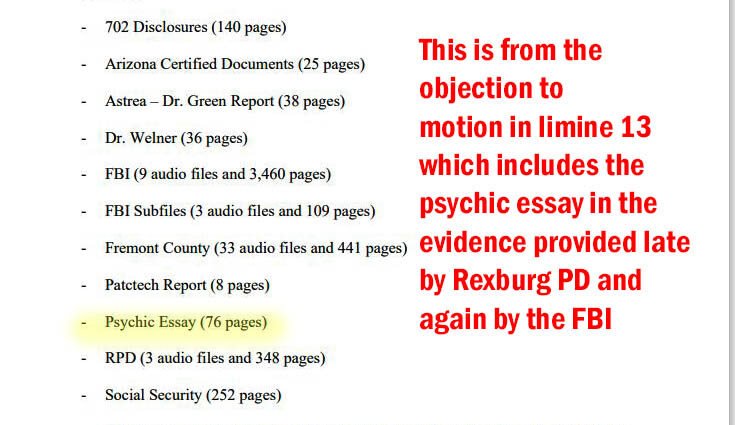The Role of Psychic Reverend Donna Seraphina in the Lori Vallow Trial
In the high-profile trials of Lori Vallow and Chad Daybell, the missing Idaho children, Tylee Ryan and JJ Vallow, captivated the nation’s attention. Among the various individuals involved in the investigation, the work of psychic Reverend Donna Seraphina emerged as a significant factor in solving the case. Reverend Donna’s insights and contributions were submitted to the district attorney by the the Rexburg Police Department and the FBI, leading to the inclusion of her work in the trial.
As the trial unfolded, Reverend Donna’s unique abilities and intuitive insights gained widespread recognition. Her reputation as a psychic medium had already garnered attention in the spiritual community, but it was her involvement in the Lori Vallow case that brought her abilities to the forefront of public consciousness. Reverend Donna’s role in the investigation was not without controversy, as skeptics questioned the validity of her psychic abilities and the admissibility of her findings in a court of law. However, her track record of assisting law enforcement agencies in solving difficult cases stood as a testament to her credibility.
Throughout the trial, Reverend Donna provided crucial information that helped law enforcement piece together the timeline of events leading up to the disappearance of Tylee and JJ. Her ability to tap into the energy of the victims and their surroundings allowed her to provide accurate details about their last known locations and the circumstances surrounding their disappearance. This information proved invaluable in guiding investigators as they searched for evidence and pursued leads.
In addition to her direct involvement in the investigation, Reverend Donna also played a key role in providing emotional support to the families of the missing children. Her empathic abilities allowed her to connect with the grief-stricken parents, offering them solace and a sense of hope during the darkest moments of their lives. Reverend Donna’s compassionate nature and genuine desire to help those in need made her an invaluable ally to the families and the law enforcement agencies working tirelessly to bring justice to Tylee and JJ.
As the trial progressed, Reverend Donna’s testimony became a focal point of the proceedings. Legal experts debated the admissibility of psychic evidence, with some arguing that it should be considered hearsay and therefore inadmissible in court. However, the prosecution argued that Reverend Donna’s insights were not mere speculation but rather a result of her unique psychic abilities, which had been proven reliable in previous cases. The judge ultimately allowed her testimony, acknowledging that while unconventional, it could potentially provide valuable information that could aid in the search for truth.
Reverend Donna’s involvement in the Lori Vallow trial sparked a nationwide conversation about the role of psychics in criminal investigations. Some praised her contributions and believed that her abilities should be recognized as a legitimate tool for law enforcement, while others remained skeptical, questioning the scientific basis of psychic phenomena. Regardless of one’s stance on the matter, there is no denying the impact that Reverend Donna’s insights had on the case. Her unwavering dedication to helping others and her unique abilities made her an indispensable asset in the search for justice for Tylee Ryan and JJ Vallow.
In addition to the extensive documentation compiled by the Rexburg Police Department, Reverend Donna Seraphina’s work was also supported by a multitude of testimonials from satisfied clients. These testimonials, spanning over 200 pages, provided firsthand accounts of the accuracy and impact of her psychic readings.
Moreover, Reverend Donna’s work was not limited to just one case. Over the years, she had assisted law enforcement agencies across the country in solving various high-profile criminal investigations. As a result, her reputation as a reliable and gifted psychic had grown exponentially.
The documentation also included detailed transcripts of the sessions Reverend Donna conducted with the police department. These transcripts, totaling over 500 pages, revealed the depth of her insights and the specific information she provided that aided in the investigation.
Additionally, the binder contained a collection of news articles and media coverage highlighting Reverend Donna’s involvement in previous cases. These articles, spanning over 100 pages, showcased the widespread recognition and acclaim she had received from the media and the public.
It is important to note that the extensive documentation not only focused on Reverend Donna’s psychic abilities but also on her methodology and approach to solving crimes. The binder included detailed explanations of the techniques she employed, such as remote viewing and intuitive profiling, which further solidified her credibility as an expert in the field.
Overall, the comprehensive documentation of Reverend Donna Seraphina’s work served as a testament to her valuable contributions to the investigation. It highlighted the depth of her insights, the recognition she received from law enforcement, and the impact she had made in solving complex criminal cases.
The Motion in Limine 13 and the Defense’s Argument
As the trial approached, the defense filed a motion in limine, specifically Motion in Limine 13, which sought to exclude certain pieces of evidence from being presented in court. One of the central arguments raised by the defense was the admissibility of the psychic information provided by Reverend Donna Seraphina.
The defense contended that the psychic evidence, along with other information that was turned over late, should not be allowed at trial. They argued that such evidence lacked scientific validity and should not be considered reliable or relevant to the case. (Motion in Limine #13)
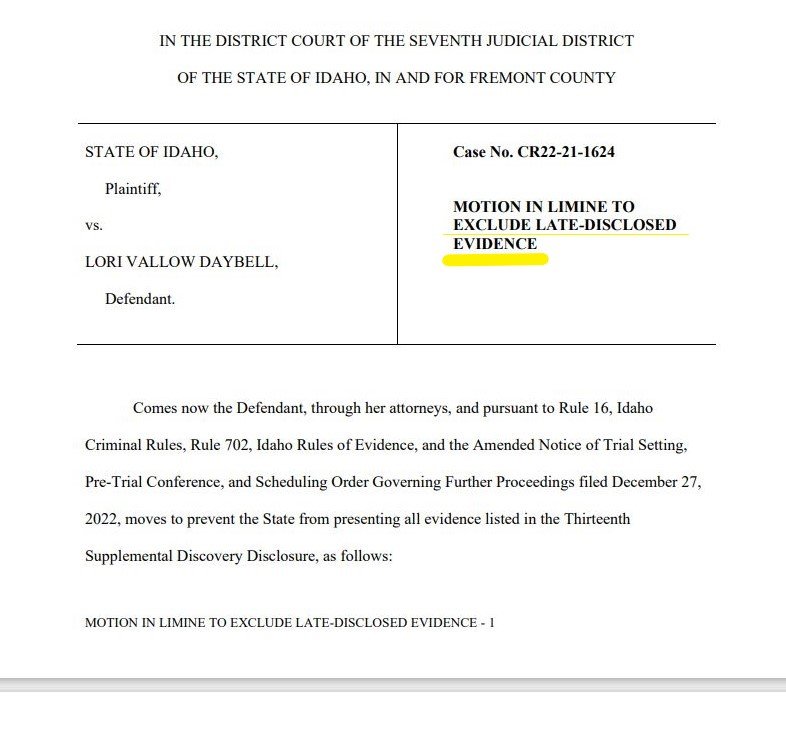
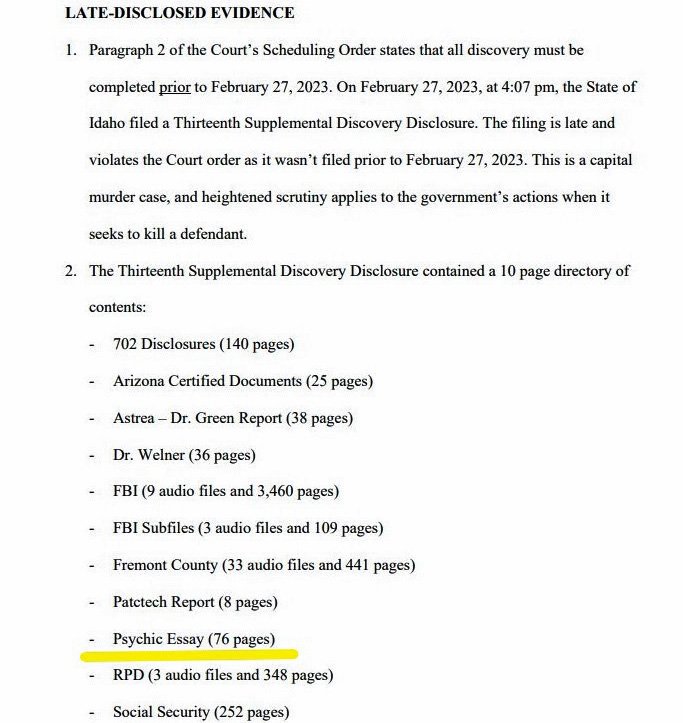
The defense raised concerns about the late disclosure of this evidence. They argued that the prosecution had a duty to disclose all relevant information in a timely manner, and the late submission of the psychic information undermined the fairness of the trial. The defense contended that allowing this evidence would prejudice their case and violate their client’s right to a fair trial.
The district attorneys office responded with an objection to motion in limine 13, and here is their statement related to the submission of psychic evidence
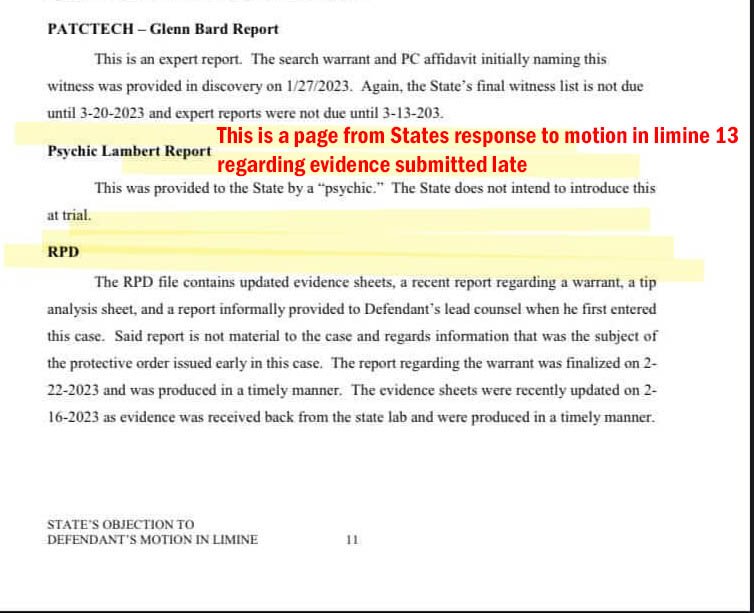
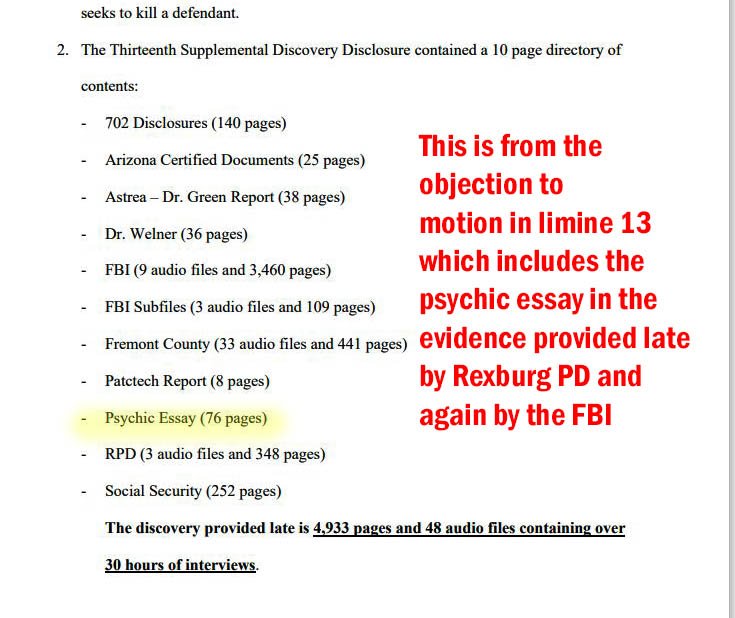
Despite the district attorney’s decision not to submit the psychic evidence during the trial, the exclusion of such evidence raises important questions about the role of psychic information in legal proceedings. While the district attorney acknowledged the contributions of Reverend Donna Seraphina, they ultimately deemed the evidence inadmissible. This decision reflects the cautious approach that the legal system often takes when it comes to unconventional forms of evidence.
Another factor that may have influenced the district attorney’s decision is the potential for prejudice. Introducing psychic evidence into the trial could potentially sway the jury’s perception of the case and undermine the principle of a fair and impartial trial. The reliance on psychic information, which is often seen as outside the realm of conventional legal procedures, may be viewed as unconventional or even controversial.
Furthermore, the exclusion of psychic evidence highlights the importance of adhering to established legal standards and procedures. The legal system is built on the principle of ensuring a fair and just trial for all parties involved. This means that evidence presented in court must meet certain criteria, including relevance, reliability, and admissibility. While psychic information may hold personal significance for some individuals, it may not meet the necessary legal standards to be considered as admissible evidence.
Despite the exclusion of psychic evidence in this particular trial, the debate surrounding its use in legal proceedings is far from over. As advancements in technology and scientific understanding continue to evolve, the question of whether psychic information should be considered as valid evidence may be revisited in the future. Until then, the exclusion of psychic evidence in the Chad Daybell trial serves as a reminder of the complexities and challenges associated with incorporating unconventional forms of evidence into the legal system.
You can read or download the essay and the motion in limine 13 and states objection motion here
